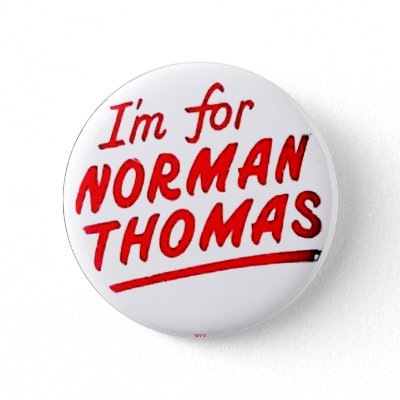
Norman Mattoon Thomas (November 20, 1884 – December 19, 1968) was a leading American socialist, pacifist, and six-time presidential candidate for the Socialist Party of America. Thomas ran for office four times in quick succession on the Socialist ticket — for Governor of New York in 1924, for Mayor of New York in 1925, for New York State Senate in 1926, for Alderman in 1927. Following Eugene Debs' death in 1926, there was a leadership vacuum in the Socialist Party. Neither of the party's two top political leaders — Victor L. Berger and Hillquit — were eligible to run for President of the United States by virtue of their foreign birth. The third main figure, Daniel Hoan was occupied as Mayor of Milwaukee, Wisconsin. Down to approximately 8,000 dues paying members, the Socialist Party's options were limited, and the little known minister from New York with oratorial skills and a pedigree in the movement became the choice of the 1928 National Convention of the Socialist Party as its standard bearer. In 1934, he ran for U.S. Senator from New York and polled almost 200,000 votes, then the second best result of Socialist candidates in New York state elections. The 1928 campaign marked the first of six consecutive campaigns of Thomas running as the Presidential nominee of the Socialist Party. As an articulate and engaging spokesman for democratic socialism, Thomas' influence was considerably greater than that of the typical perennial candidate. Although socialism was viewed as an unsavory form of political thought by most middle-class Americans, the well-educated Thomas — who often wore three-piece suits — looked like and talked like a president and gained grudging admiration. Thomas frequently spoke on the difference between socialism and Communism, explaining the differences between the movement he represented and that of revolutionary Marxism. Socialism is an economic and political theory advocating public or common ownership and cooperative management of the means of production and allocation of resources. Communism is a sociopolitical movement that aims for a classless society structured upon communal ownership of the means of production and the end of wage labor and private property. The exact definition of communism varies and it is commonly used interchangeably with socialism, however, communist theory contends that socialism is just a transitional stage on the way to communism. Thomas' early admiration for the Russian Revolution subsequently turned into energetic anti-Communism. (The revolutionaries thought him no better; Leon Trotsky, on more than one occasion, levelled high-profile criticism at Thomas.) He wrote several books, among them his passionate defense of World War I conscientious objectors, Is Conscience a Crime?, and his statement of the 1960s social democratic consensus, Socialism Re-examined. Repro pub dom.
Just Sold on Zazzle
Real sold zazzle designs collected here, let's get inspired by real things and make money on Zazzle.
